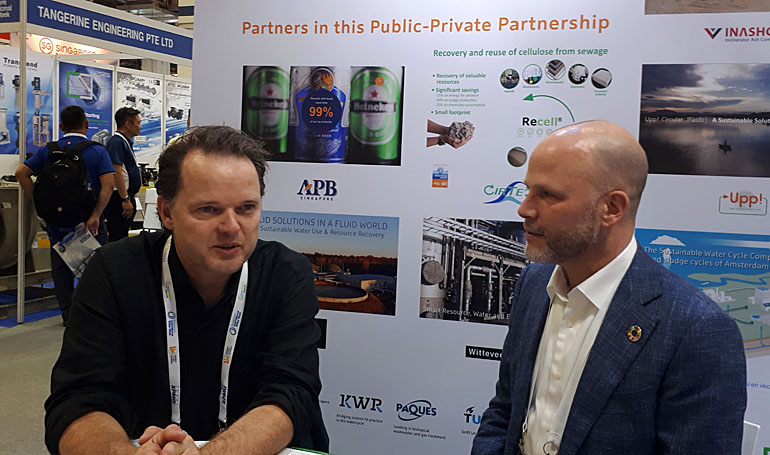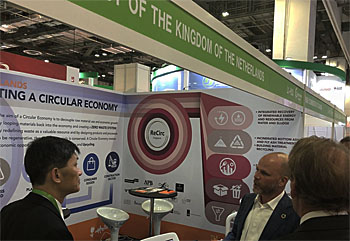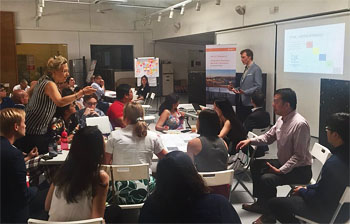SIWW 2018: ReCirc Singapore explores joint r&d and business agenda on engineering zero waste systems
 Singapore wants to become a zero waste nation and aims to recycle 70 percent of its waste by 2030. The Netherlands aims at a fully circular economy by 2050. Two huge ambitions that cannot be achieved by simply programming and financing a number of measures. A new systematic approach is needed. This was the main topic discussed at the workshops organised by the public-private consortium ReCirc during and after the Singapore International Water Week and CleanEnviro Summit Singapore.
Singapore wants to become a zero waste nation and aims to recycle 70 percent of its waste by 2030. The Netherlands aims at a fully circular economy by 2050. Two huge ambitions that cannot be achieved by simply programming and financing a number of measures. A new systematic approach is needed. This was the main topic discussed at the workshops organised by the public-private consortium ReCirc during and after the Singapore International Water Week and CleanEnviro Summit Singapore.
ReCirc was one of the prominent participants in the Netherlands Pavilion and was actively engaged with Singapore government agencies, businesses and researchers to develop a joint r&d and business agenda.
 Circular economy was a main theme for the Dutch contribution at the combined events of Singapore International Water Week, World Cities Summit and CleanEnviro Summit.
Circular economy was a main theme for the Dutch contribution at the combined events of Singapore International Water Week, World Cities Summit and CleanEnviro Summit.
Bridging different concepts
One of the main aims of the ReCirc consortium at the Singapore International Water Week was to bridge the gap in the different national policies. As Bob Geldermans (left on top photo), programme manager at Amsterdam Institute for advanced Metropolitan Solutions (AMS) explained: 'Zero waste in Singapore is not the same as a circular economy as presented by the Netherlands. Zero waste is often seen as sending the waste to an incinerator, instead of to a landfill.'
From an environmental perspective, incineration is preferable over landfilling, but this still leaves a residue – ashes - to be handled.
This is where the circular thinking comes in, Geldermans explains: ‘Circular economy is about upgrading waste. It is a different approach as it seeks to produce materials that can effectively replace raw materials. We need to forge smart partnerships to be able to upcycle new materials’.
Waste to energy plant
An example of such a smart partnership is the integration of the incineration of sludge from waste water treatment and solid waste from households in Amsterdam. The waste water treatment plant of Amsterdam's water utility Waternet is situated next to the incinerator for municipal waste of Amsterdam Energie Bedrijf (AEB). By combining the two waste streams, the waste-to-energy incinerator can recover 30 percent of the potential energy in the waste, compared to 25 percent by other - stand-alone - incinerators of municipal waste.
This integrated incineration concept has also been adopted by Singapore. The Singapore authorities have decided to build a new municipal waste incinerator alongside the future Tuas waste water treatment plant, enabling to combined treatment of sewage sludge and solid waste.
 Workshop by ReCirc Singapore with over 50 actively involved experts exploring resource recovery solutions.
Workshop by ReCirc Singapore with over 50 actively involved experts exploring resource recovery solutions.
Workshop on joint research agenda
The Dutch-Singapore ReCirc workshop focussed on four themes: bottom and fly ash from incinerators, waste water and sludge, plastic waste and food waste systems.
According to Arjen Nieuwenhuijzen (right on top photo) of Witteveen+Bos, coordinator of ReCirc, the different sessions on the four themes and the system integration, created in many learning moments that will be translated into concrete actions in the coming months.
'We have seen a lot of enthusiasm and willingness to develop smart solutions together to tackle the waste and water challenges of Singapore and to create business opportunities for Singapore and The Netherlands in de South East Asia region', said Nieuwenhuijzen.
About ReCirc
ReCirc Singapore is a public-private partnership facilitated by the Netherlands Enterprise Agency: a coalition between business, government, civil society organisations and knowledge institutes in the field of circular economy for resource recovery and zero waste solutions.
Participants in the ReCirc Consortium are water utility Waternet, national public work authority Rijkswaterstaat, research institutes AMS institute, KWR, Delft University of Technology and Wageningen University&Research. Companies that participate are consultancy firm Witteveen+Bos (initiator and coordinator), Nijhuis Industries, Inashco, Paques, CirTec, Asia Pacific Breweries, Heineken, Organic Village and Upp! UpCycling Plastic.
Read also on this website
● SIWW 2018: HSL and Urban Farming Partners take Singapore to next level of indoor food production, 13 July 2018
● SIWW 2018: CirTec pitches recovery of used toilet paper to world top experts, 12 July 2018
● SIWW 2018: Ban Ki-moon salutes global water industry, 11 July 2018
● SIWW 2018: ‘Growth of cities is to stay, get used to it’, 10 July 2018
● ReCirc Singapore aims at joint development of resource recovery technology for circular economy, 19 December 2017
● Meet the Dutch water sector in the Netherlands Water Pavilion at SIWW2018
More information
Singapore International Water Week
www.siww.com.sg
Holland Innovation Network
Netherlands Embassy Singapore
+65 6737 1155
www.hollandinnovation.sg



